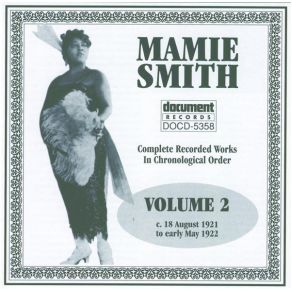Mamie Smith Vol. 2 (1921-1922)
Download links and information about Mamie Smith Vol. 2 (1921-1922) by Mamie Smith. This album was released in 1995 and it belongs to Blues genres. It contains 24 tracks with total duration of 01:13:36 minutes.

|
|
|---|---|
| Artist: | Mamie Smith |
| Release date: | 1995 |
| Genre: | Blues |
| Tracks: | 24 |
| Duration: | 01:13:36 |
| Buy it NOW at: | |
| Buy on iTunes $9.99 | |
| Buy on Amazon $8.99 | |
Tracks
[Edit]| No. | Title | Length |
|---|---|---|
| 1. | Sweet Man O' Mine | 3:19 |
| 2. | Mame Whip! Mama Spank! | 3:16 |
| 3. | I'm Free, Single, Disengaged, Looking for Someone to Love | 2:54 |
| 4. | Weepin' | 3:03 |
| 5. | A Wearin' Away the Blues | 3:12 |
| 6. | Down Home Blues | 3:05 |
| 7. | Get Hot | 3:08 |
| 8. | Oh, Joe (Please Don't Go) | 3:11 |
| 9. | A Little Kind Treatment | 3:13 |
| 10. | Arkansas Blues (A Down Home Chant) | 3:09 |
| 11. | The Wang, Wang Blues | 3:09 |
| 12. | Stop! Rest a While | 3:00 |
| 13. | Sweet Cookie | 3:10 |
| 14. | Let's Agree to Disagree | 2:48 |
| 15. | Rambling Blues (Instrumental) | 3:09 |
| 16. | Cubanita (Instrumental) | 2:50 |
| 17. | The Decatur Street Blues (Instrumental) | 3:08 |
| 18. | Carolina Blues (Instrumental) | 3:08 |
| 19. | Doo-Dah Blues | 2:57 |
| 20. | There's Only One Man (That Satisfies Me) | 2:57 |
| 21. | Wabash Blues | 3:08 |
| 22. | Mean Daddy Blues | 2:58 |
| 23. | Dem Knock-Out-Blues | 2:47 |
| 24. | Lonesome Mama Blues | 2:57 |
Details
[Edit]Volume two in the complete recordings of Mamie Smith as reissued by Document in 1995 follows her career as an Okeh recording artist from August 18, 1921 through early May of 1922. Although her groups were almost invariably billed as the Jazz Hounds, the band accompanying her on tracks 1-13 (listed as her Jazz Band) was really the Joseph Samuels Orchestra, a well-behaved but capably hot Caucasian unit that also recorded as the Synco Jazz Band and the Tampa Blue Jazz Band. During the provocatively titled "Mamma Whip! Mamma Spank!," Smith seems to have been able to relax and deliver an artful performance that conveys a taste of what she must have sounded like when caught live on-stage. Other delights from this portion of the timeline include enjoyable treatments of Perry Bradford's "Down Home Blues," the catchy "Arkansas Blues," and that essential vaudevillian and traditional jazz staple, the "Wang Wang Blues." During the winter of 1921, Mamie Smith's Jazz Hounds (with young Bubber Miley temporarily replacing cornetist Johnny Dunn) toured the T.O.B.A. circuit, premiering at Pittsburgh's Pershing Theater as the last act in a vaudeville revue. Smith, who wore some of the fanciest and most rhinestone-encrusted outfits in the business, experienced unanticipated hook-and-eye trouble while attempting to execute one of her famous, lightning-quick off-stage costume changes. The band was told to keep playing "Royal Garden Blues" over and over again until she could get back on. As she became hopelessly entangled, Miley's lip gave out completely and the audience booed the band off the stage. Fortunately for those who value an opportunity to hear Miley years before his experiences with Duke Ellington, four instrumental selections from this period are included here. They are: "Rambling Blues," "Cubanita," "The Decatur Street Blues," and "Carolina Blues." Additionally, Smith tosses off a beautiful rendition of the old "Wabash Blues." The Jazz Hounds played the Avenue Theater in Chicago, where they were able to hear Freddie Keppard and King Oliver (major influences on Bubber Miley), followed by a series of engagements at the 12th Street Theater, a white burlesque house in Kansas City. Here the Hounds found themselves absorbed into a variety show billed as Mamie Smith and Company, with dancers, singers, comedians, and a prestidigitator. Soon the band was enlarged slightly by the addition of George Bell, a violinist from Detroit, and a very young C-Melody saxophonist from St. Joseph, MO named Coleman Hawkins who was already displaying unerringly fine musicianship. Deemed too young to leave home (according to his grandmother), Hawkins did not accompany the Jazz Hounds to Detroit, MI where they appeared with Smith at the S.H. Dudley and Copeland Theaters on Gratiot Avenue. The last three tunes on this second volume of vintage Mamie Smith date from May 1922 and feature Hawkins (now blowing tenor sax) alongside cornetist George Mullen, trombonist Cecil Carpenter, clarinetist Bob Fuller, the aforementioned fiddler Bell, pianist Charles Matson, and either Curtis Mosby or Cutie Perkins behind the drums.